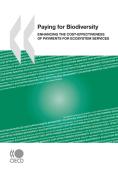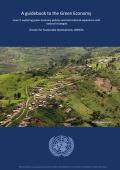
Biodiversity and ecosystem services provide tangible benefits for society, such as food provisioning, water purification, genetic resources or climate regulation. These services provide critical life support functions and contribute to human health, well being and economic growth. Yet biodiversity is declining worldwide and, in some areas, this loss is accelerating. The need for policies that promote the conservation and sustainable use of biodiversity and ecosystem services is more important than ever.
Payments for Ecosystem Services (PES) is a direct and flexible incentive-based mechanism under which the user or beneficiary of an ecosystem service makes a direct payment to an individual or community whose land use decisions have an impact on the ecosystem service provision. Interest in PES has been increasing rapidly over the past decade: PES are proliferating worldwide and there are already more than 300 programmes in place today at national, regional and local levels.
This volume examines the experiences of 21 developed and developing countries in adjusting their training provision to meet the new demands of a greener economy. Analysts started by identifying the drivers of transformation to a greener economy – changes in the physical environment itself and changes induced by government regulations, more efficient technologies and changes in consumer demand. Then they assessed the effect of these changes on employment, identifying areas of job growth and of job loss
Only then could researchers start to understand how skill requirements are changing and are expected to change in the future, and to examine how well national training systems are anticipating and responding to these new needs. Their analysis shows that skills development is critical to unlocking the employment potential of green growth, yet skills shortages are becoming an obstacle in realising this potential. The report recommends that countries devise strategies based on well-informed policy decisions, social dialogue, and coordination among ministries and between employers and training providers.
Sustained growth in Brazil, China, India, Indonesia and South Africa will be critical for the global economy in the coming decades. This volume, based on the proceedings of a conference organised by the Economics Department of the OECD on 24 September 2009, analyses growth performance in these five emerging market economies and the prospects for sustaining strong growth over the longer term. Drawing on contributions from distinguished policymakers and scholars, the volume discusses the specific drivers of growth in each of the five countries with which the OECD has had a programme of Enhanced Engagement since May 2007.

Green economy in the context of sustainable development and poverty eradication was one of two themes at the UN Conference on Sustainable Development held in Rio de Janeiro in June 2012 (or Rio+20).
Negotiations on green economy in the lead up to Rio+20 were challenging and the concept became a source of controversy and disagreement. Despite these challenges, governments agreed at Rio+20 to frame the green economy as an important tool for sustainable development; one that is inclusive and can drive economic growth, employment, and poverty eradication, whilst maintaining the healthy functioning of the Earth’s ecosystems. Importantly, the outcome document also recognises that capacity building, information exchange and experience sharing will be critical for implementing green economy policies. In this context, the document invites the UN to work with partners to provide support to developing countries and to develop toolboxes, best practices, methodologies and models to aid green economy policy design and implementation.
This guide is aimed primarily at national planners and policy advisors in developing countries, focusing on the role of economic tools in planning for green growth. Some of the questions explored by the guide include: How do decision makers create a vision and strategy for green growth? What skills do planners need to work effectively with the range of green growth tools available? And how to assess which tools are right for them?
The Guide concludes that green growth planning needs to be an iterative process, adapting to local developments over time and responding to the needs of national and local stakeholders. Planners rarely find the process straightforward and rely on economic principles and tools to inform the process. However, conventional tools may not address environmental and social dimensions adequately or look beyond economic metrics. New tools and methods have emerged and existing ones have also evolved. Opening up these tools so that they’re more than a ‘black box’ and using them to obtain stakeholders’ buy-in remain key challenges.
